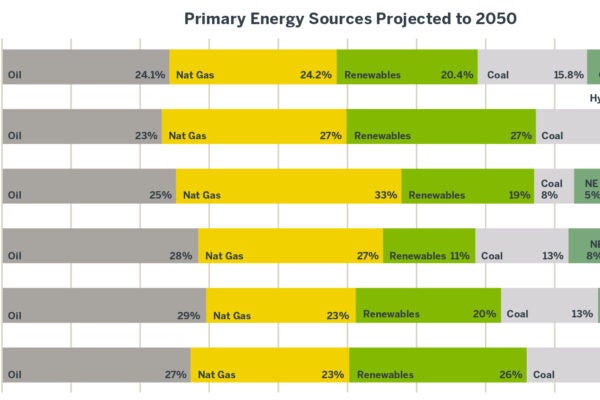Energy Production Drives U.S. Global Strength
Hutchison, geopolitical speakers agree that energy production is vital to the nation’s impact worldwide and security at home

Energy resilience is essential to U.S. global influence, former Sen. Kay Bailey Hutchison said recently at The University of Texas at Austin during a panel discussion exploring the geopolitics of energy and security.
“We must invest in American energy — all types — like never before. And we must use our enhanced energy independence, not simply to maintain our own technological and military superiority, but that of our allies as well,” she said. For example, fuel determined early outcomes in the war in Ukraine, she said.
“In 2022, Russia’s tanks literally ran out of gas on their way to Kyiv,” she pointed out to those gathered for UT’s annual Energy Week. Had they not, the war might have turned out very differently, said the former ambassador to NATO.
Dependence on energy resulted in Europe’s muted response to Russian aggression in 2014, when Russia unilaterally annexed Crimea, historically a part of Ukraine. For decades, Europe has been dependent on Russian energy, and only the U.S. can end this dependence, she continued.
Historically, U.S. energy production has been the cornerstone of the nation’s impact worldwide and security at home, added panelists George Seay, founder of Annandale Capital, and Wil VanLoh, CEO of Quantum Capital Group.
“World War II wasn’t won on courage alone — it was won with energy as well,” said Seay. “Our tanks never ran out of gas. Our planes never ran out of gas. We had an unlimited amount of energy from the Permian Basin, which really served our country very, very well.”
![SCP 3130[64]](https://news.mccombs.utexas.edu/wp-content/uploads/2025/05/SCP_313064-1200x800.jpg)
Likewise, he added, America’s decision to resupply Israel in 1973 during the Yom Kippur War tipped the balance in that conflict, despite an Arab oil embargo. As for the Cold War, it didn’t end with nuclear war, Seay continued. It ended with the collapse of the Soviet economy in part after President Ronald Reagan persuaded the Saudis to flood the global oil market, which tanked the price and undercut Soviet energy exports.
VanLoh explained how Chinese power is shaped by their energy demands and supplies. “China imports a massive amount of their energy,” said VanLoh, pointing out that much of those imports come through choke points such as the Strait of Malacca. In a time of conflict, it could be blocked by the U.S. military.
For that reason, China has doubled down on coal, despite its tremendous environmental costs. “The worst thing for the environment is every time China sells a new electric vehicle,” VanLoh quipped, explaining that those vehicles are essentially coal powered.
In addition, he said that China has turned to renewables, having tied up supplies of many raw materials around the world needed in wind and solar power production through its Belt and Road infrastructure initiatives. China “is the super-super OPEC plus-plus-plus of renewables.”

Going forward
The group agreed that the U.S. has the assets it needs to remain the world’s greatest power — but those assets need to be unlocked.
In the future, the U.S. must generate enough energy to propel the artificial intelligence revolution at home, to supply our allies abroad, and to compete with adversaries around the world.
VanLoh sees a window of opportunity now, but it is closing. The shale revolution has been the foundation of American energy independence for 15 years, but it is winding down, while next generation nuclear is still a decade or more away.
To maximize the potential of natural gas, we need Washington to authorize and fund the building of new pipelines, power plants and export terminals, he said.
We must see energy security fundamentally as national security, Hutchison said.
“I want America to be America again. A good neighbor, a trusted ally, and a formidable enemy.”
Note: The panelists were brought together by the Kay Bailey Hutchison Energy Center and the Clements Center for National Security as part of Energy Week, co-hosted by the KBH Energy Center and the UT Energy Institute. The talk was moderated by Paul Edgar, associate director of the Clements Center.
By Ben Wright
About this Post
Share:


